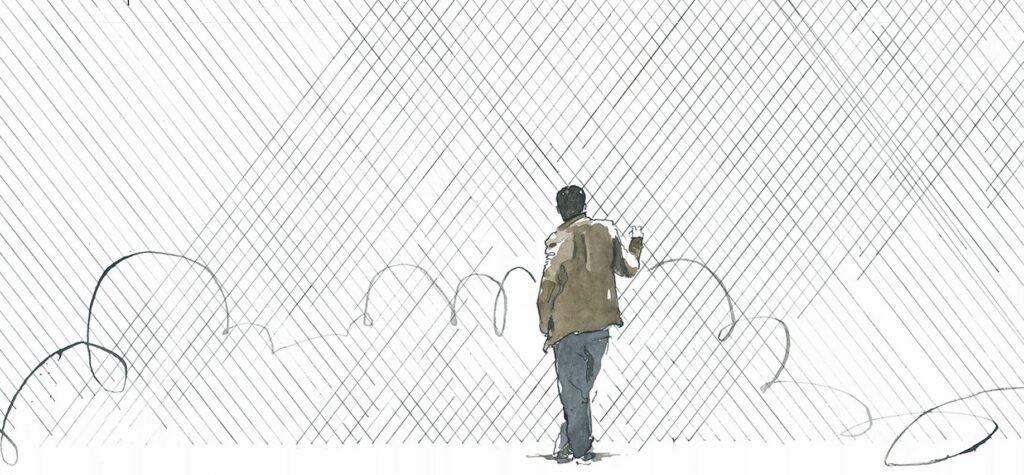
Summary of Topic
As the physical world is being reshaped by climate crises, nations around are the world are faced with an existential crisis of their own. The concepts of property, border, and nations are losing meaning because sea level is rising and some lands are becoming uninhabitable. Nations are grappling with this loss by criminalizing migration and movement because nations themselves are built on the foundation of sedentism. Therefore, historical narratives privilege sedentism over mobility. While sedentary populations are considered civilized nomadic population are stigmatized as “barbaric”. The influence of this biased historic narrative can be seen in the tension between nation-states and migrants today. While nation-states and their citizens represent sedentary society, migrants represent a nomadic society. However, to alleviate the stresses and trauma of forced migration that will be induced by climate crises, migration must be decriminalized and the right to move must be protected as an inalienable human right.
Summary of Research – Structural Violence
Violence is defined by the World Health Organization as “the intentional use of physical force or power, threatened or actual, against oneself, another person, or against a group or community, that either results in or has a high likelihood of resulting in injury, death, psychological harm, maldevelopment, or deprivation”. Citizens of nation-states are implicated in the suffering of migrating populations through their participation in structural violence. Structural violence represents an indirect form of violence that is built into the political structures and systems of civilized society. This kind of violence is evident in the hierarchies and inequalities imbued in nation-states. Citizens of nation-states are complicit in structural violence through their inaction, silence, and indifference.
The term systemic injustice can be used interchangeably with structural violence. It is the outcome of privileged individuals and institutions pursuing their own interests within established political orders to benefit from social norms while disregarding the suffering migrants or stateless people are subjected to within these systems. Systemic injustice is suffered by mobile, stateless people in a global political system that privileges citizenship over non-citizenship. It is perpetuated by citizens who contribute to it by taking harmful socio-political norms for granted and leaving them unquestioned. Though political leaders are often blamed for designing systems that are unjust, the role citizens play in contributing to systemic injustice by electing leaders who uphold damaging political systems is often overlooked. This complicity applies to addressing climate crises and climate induced migration as well.
More importantly, systemic injustice is built on the principle of misrecognition. Jade Larissa Schiff defines misrecognition as “a disposition that conceals both the contingent character of social life and the forms of domination it sustains” (745). Through misrecognition, we learn to accept injustice as the way of the world, while remaining unaware of contributing to it. For instance, we take it for granted that human rights are associated with national rights. According to Hannah Arendt, most migrants lose their human rights when they lose their national rights. She argues that human rights should be inalienable and separate from all national governments. In other words, those who leave the security of their nation due to climate crises may lose their human rights and be rendered invisible through systemic injustice, just as countless refugees and undocumented workers are already made invisible. Therefore, climate crises and the mass migration it will fuel is a call to challenge the political systems we take for granted and the systemic injustice the inflict. Migration and the right to move must be protected as inalienable human rights, as more people around the world are uprooted due to climate crises.

Similarly, Isabelle Stengers reminds us that blindness is demanded of us because it is the only way nation-states can uphold the violent political structures that continue to displace and marginalize millions of people. She urges us to practice the “art of paying attention” to counter misrecognition, indifference, and the systemic injustices citizens are complicit in. For Stengers, to question the political systems that have been presented to us as the inevitable outcome of the civilizing process and to imagine alternative systems that are more just are political acts in themselves. Hannah Arendt’s poignant statement sums up what could happen if nation-states and their citizens continue to uphold systems that are structurally violent and exclude masses of people: “For it is quite conceivable,… that one fine day a highly organized and mechanized humanity will conclude quite democratically… that for humanity as a whole it would be better to liquidate certain parts thereof” (298-299). Her chilling words have the potential to come true if nation-states and citizens of the Global North remain indifferent and stop paying attention.
Resources
- Agamben, Giorgio. “Beyond Human Rights.” Radical Thought in Italy: A Potential Politics, vol. 7. edited by Paolo Virno and Michael Hardt, University of Minnesota Press, 1996, pg. 159–166.
- Arendt, Hannah. “The Decline of the Nation-State and the End of The Rights of Man.” The Origins of Totalitarianism. Ohio: The World Publishing Company, 1958, pg. 267-302.
- Cronon, William. Changes in the Land: Indians, Colonists, and the Ecology of New England. Hill & Wang, 2003.
- Jalal, Talha. “Re-Imagining the Refugee.” Crossings: Journal of Migration & Culture, vol. 5, no. 2, 2014, pg. 317-326.
- Jones, Reece. Violent Borders: Refugees and the Right to Move. Verso, 2016.
- Schiff, Jade Larissa. “Welcoming Refugees: Mindful Citizenship and the Political Responsibility of Hospitality.” Signs: Journal of Women in Culture and Society, vol. 43, no.3, 2018, pg. 737-762.
- Scott, James C. Against the Grain: A Deep History of the Earliest States. Yale University Press, 2017.
- Stengers, Isabelle. In Catastrophic Times: Resisting the Coming Barbarism. Translated by Andrew Goffey, Open Humanities Press, 2015.


